Saul Schiff: A Jewish American Soldier
Veterans Day Edition
Written by Joe McGovern and Illustrated by Anthony Speer
For the series A BOOK by ME - True Stories Written by Kids for Kids
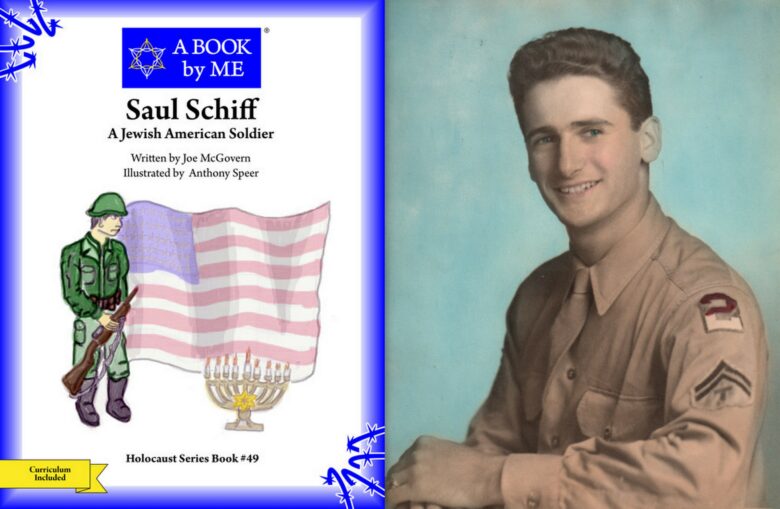 Today I salute the memory of WWII Veteran Saul Schiff. Saul had an amazing voice. He’s the only person I’ve met who sang at Carnegie Hall in New York City. Through my friendship with him, I learned during WWII American soldiers, many Jewish, witnessed the horrors of the concentration camps. Saul was one of those Jewish soldiers who described what he saw as “beyond belief” with piles of dead bodies, train cars filled with decomposed human remains and “walking skeletons”, the Jews who managed to survive. The evidence of the Nazi atrocities was everywhere. My husband and I knew Saul and his wife Esther for years before he could tell us what he saw in Dachau concentration camp.
Today I salute the memory of WWII Veteran Saul Schiff. Saul had an amazing voice. He’s the only person I’ve met who sang at Carnegie Hall in New York City. Through my friendship with him, I learned during WWII American soldiers, many Jewish, witnessed the horrors of the concentration camps. Saul was one of those Jewish soldiers who described what he saw as “beyond belief” with piles of dead bodies, train cars filled with decomposed human remains and “walking skeletons”, the Jews who managed to survive. The evidence of the Nazi atrocities was everywhere. My husband and I knew Saul and his wife Esther for years before he could tell us what he saw in Dachau concentration camp.
Some say witnessing this horror fueled the American soldier’s determination to fight the Nazis to assure this would never happen again. After the war, many became advocates for Holocaust education to ensure the world would never forget. Now more than ever, we must educate youth on this important subject to understand the immense human suffering and the consequences of unchecked hatred, prejudice and discrimination. Holocaust education reminds us of the dangers of intolerance and can help prevent future genocides and atrocities.
After the war, Saul came home and once his beloved Esther immigrated to America, he was right there to court her. They had met briefly in Europe and she caught his eye. Soon they married and raised a wonderful family in the Quad Cities where he worked for the U.S. Army at Rock Island Arsenal in Illinois. I’m grateful that two young men from Iowa preserved the story of this great American hero for young readers.
– Deb Bowen, Creator A BOOK by ME
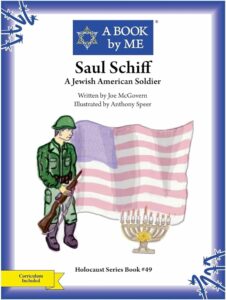 Read the story of Saul Schiff, a Jewish American soldier who witnessed the horrors of Hitler’s Holocaust. Saul served his country and helped win the war. Saul was assigned to sound ranging in the army, and traveled to France, Scotland, England, and Germany. He fought in the Battle of the Bulge, as well as many other battles. He hid in foxholes and under military trucks. After the war, he passed by Dachau concentration camp. Afterward, he saw his fellow Jews trying to pick up the pieces of their broken lives. While in Germany, he met the love of his life, Esther Stiller, who had lost everyone she loved in the concentration camps. Young author Joe McGovern wrote his story to honor Saul for being an American hero.
Read the story of Saul Schiff, a Jewish American soldier who witnessed the horrors of Hitler’s Holocaust. Saul served his country and helped win the war. Saul was assigned to sound ranging in the army, and traveled to France, Scotland, England, and Germany. He fought in the Battle of the Bulge, as well as many other battles. He hid in foxholes and under military trucks. After the war, he passed by Dachau concentration camp. Afterward, he saw his fellow Jews trying to pick up the pieces of their broken lives. While in Germany, he met the love of his life, Esther Stiller, who had lost everyone she loved in the concentration camps. Young author Joe McGovern wrote his story to honor Saul for being an American hero.
Saul Schiff: A Jewish American Soldier – Available on Amazon
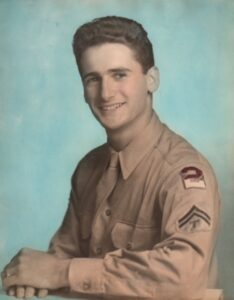
Saul Schiff in soldier uniform
“I’ve had a richly satisfying life and can take pleasure in many memorable experiences, among which were these: serving my country; meeting both my brothers in Europe during the war; seeing Paris with my oldest brother after the war ended; helping needy Jews when I found them; helping fellow humans regardless of race or religion; enjoying famed actress Marlene Dietrich entertain the troops in France; enjoying my first hot shower in Europe at a rest camp in France; getting lost with my driver in a wooded area and having a trio of German soldiers, who were seeking to surrender, approach us and taking them to a nearby American camp; escaping with my squad from sniper fire; enjoying my first tub bath overseas, meeting and marrying my wife of over 60 years; returning from the war safely and seeing my parents and siblings all healthy and well; helping defeat the Nazis; loving my country and being proud to be an American. God Bless America.”
— Saul Schiff
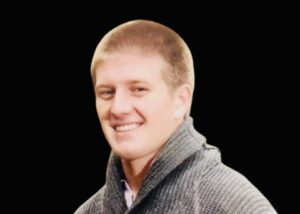
Author Joe McGovern
“I loved hearing stories from when Saul was young and also, his war stories. I learned a lot and I hope you like reading this book about his life. If you get a chance to interview a veteran for a project like this, do it. You will never regret the investment of your time. There is so much we can learn from their lives.”
— Author Joe McGovern
Saul Schiff – Jewish American Soldier
I was born in the Bronx [New York City] in 1923, the youngest of a family of four boys and one girl. Three years later, our father moved us to New Jersey, where we settled in Morristown. My parents were both European Jews, leaving their families in Europe and coming to America, “Die Goldene Medina” [a Yiddish expression of admiration for America], to escape the pogroms [a violent riot or massacre aimed at Jewish people] and other forms of anti-Semitism of the Old Country.
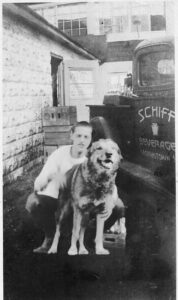
Saul next to Schiff Beverage Truck
My father, William Schiff, had emigrated from Poland at age 15 with his younger brother, landing in NYC in 1904. My mother, Rose Borgmann, came as a young girl from what was then Austria-Hungary, with her uncle. We were raised during the Great Depression, so everyone who could worked to bring home money to support our family. My father started a business called “Schiff Beverages,” and we made flavored soda pop. Sadly, in 1934, one of my brothers drowned in a deep sea fishing accident. I can still hear my mother screaming when she was told of his death. Losing a child is a tragedy I wish on no family.
I turned 20 when I was drafted in the U.S. Army and joined my two brothers already enlisted. Because I had gone to radio and television school, I was soon promoted to the rank of Corporal Technician and sent to Sound Ranging School. Sound ranging was a technique used in WWII to locate and plot the position of enemy guns which were firing on our troops and installations. Our efforts were not always 100% successful, but the threat of our truly awesome American artillery power kept the Germans uneasy and on the run.
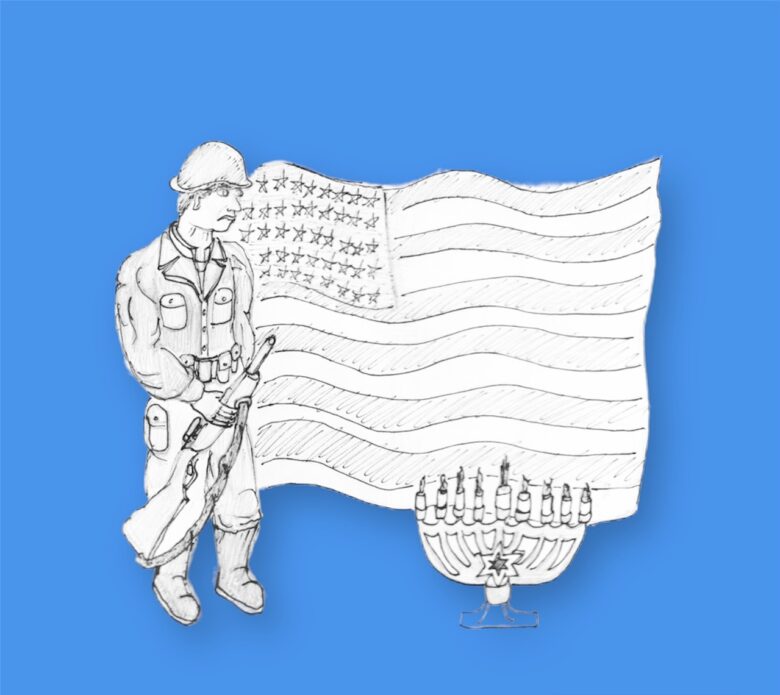
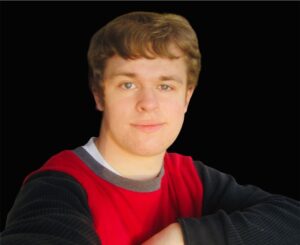
Artist Anthony Speer
In August of 1944, it was time for my outfit to leave the USA for combat in Europe. We boarded the one-time luxury ship Queen Elizabeth in New York harbor. We crossed the Atlantic and landed in Scotland to make our way to England across the English Channel from France. We loved England. It was so quaint. We stayed in England for a few days until we were taken across the channel into France, landing at Omaha Beach. Throughout the French countryside, we saw the high price paid by our troops at Normandy in pushing through the strongly entrenched Nazi forces. We took over operations from the 14th FOB in Malleloy, France, where we learned the Germans had sneaked into our forward observer outpost and captured three men, cutting their lines and leaving only a pair of shoes. This was our introduction to the real war.
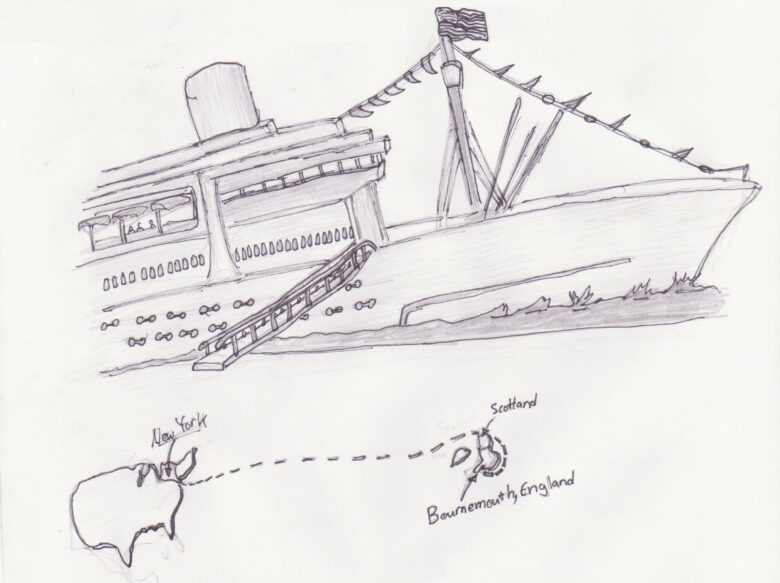
Through France, Luxembourg and Germany, Battery B records state we were involved in just short of 200 fire missions on enemy gun locations – 64 in France, 102 in Luxembourg during the Battle of the Bulge, and 28 in Germany during the waning days of the war. We were shelled by tank and artillery fire a number of times in France and in Luxembourg. We lost four guys, three wounded and one dead. One of the wounded was my tent mate who was asleep when the shells hit. I lucked out, because I was on guard duty and was not in the tent where I would normally have been at the time.
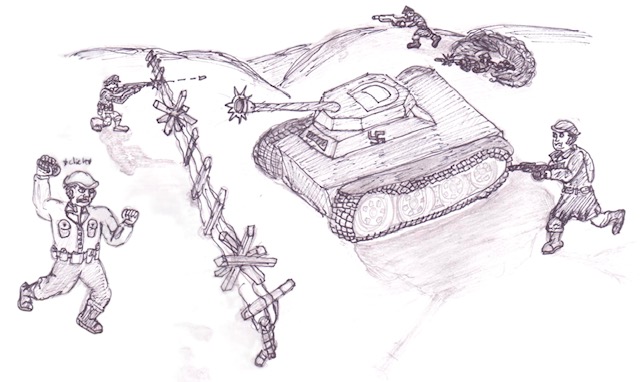
The SS contingents of the German army murdered, tortured and starved populations across Europe, using every foul and inhuman tactic in the book. In one instance, the soldiers of B Battery 285th FOB were captured, disarmed and marched to a snowy field where they were mercilessly cut down by machine gun fire. I don’t know what happened to the SS officer in charge afterward, but he should have been hanged. It was something I took very personally because I remembered many of these men from Sound Ranging School.
The fighting against Japan was still raging when Germany finally surrendered. Hitler was dead, and their armies were shattered. It was May 8, 1945, and we were quartered in Oberneukirchen, Austria. The very next day we were driven west toward Munich, Germany, where we turned north for an extended stay at a one-time military installation. Near Munich, we passed an area where we saw stripe-clothed bodies lying dead on the hills bordering the road. This was Dachau concentration camp. Our convoy, not recognizing the significance of what we had just witnessed, did not stop. Dachau, while not primarily an extermination camp, was used by the Nazis to contain, brutalize and poison the “Untermensch,” that “subhuman” class of undesirables like Jews, Gypsies, the mentally ill, who had no right to take up space in the world.
During the war, I met surviving Polish Jews. Wanting to help, I was able to get our cook to provide jobs for two young boys. I don’t know how they survived previously; they were so starved for a regular meal that they overate and became ill. Happily, they survived that, too!
While waiting for orders to go home, we sang “Dear Mr. Truman, won’t you send us home? We have conquered Naples and liberated Rome. We have kaputed the master race, and still you say ‘no shipping space’. Oh, won’t you send us home? Let the boys at home see Rome …” This was sung to the tune of Lili Marleen, a song which was probably the only good thing we learned from the Germans. I spent my time taking a U.S. Army-sponsored course in Physics at the in Freising, Germany. It was there I met Esther Stiller, a Holocaust survivor who had lost her family to the Nazis in Poland. She had survived the war working as a slave laborer on German farms. Later in America, she became my wife.
Some years later, my wife and I visited Dachau. The place was nearly deserted! Had the world forgotten already? I slipped away to be by myself and to reflect on the enormity of my surroundings. I recited Kaddish, a Jewish prayer written in ancient Aramaic which Jews chant after certain liturgical passages in memory of the dead. With the final “Amen,” I felt thoroughly fulfilled and at peace.
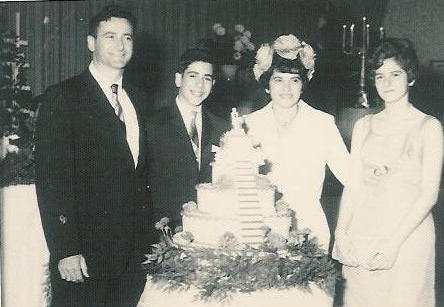
In 1988, I retired from my job as a Mechanical Engineer at the Rock Island Arsenal. I’ve had a richly satisfying life and can take pleasure in many memorable experiences, among which were these: serving my country; meeting both my brothers in Europe during the war; seeing Paris with my oldest brother after the war ended; helping needy Jews when I found them; helping fellow humans regardless of race or religion; enjoying famed actress Marlene Dietrich entertain the troops in France; enjoying my first hot shower in Europe at a rest camp in France; getting lost with my driver in a wooded area and having a trio of German soldiers, who were seeking to surrender, approach us and taking them to a nearby American camp; escaping with my squad from unlocated sniper fire; enjoying my first tub bath overseas, meeting and marrying my wife of over 60 years; returning from the war safely and seeing my parents and siblings all healthy and well; helping defeat the Nazis; loving my country and being proud to be an American. God Bless America.
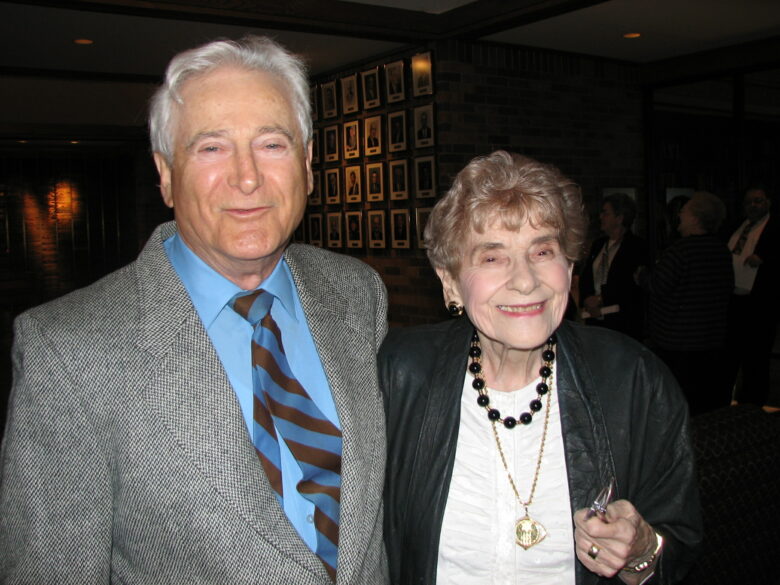
A BOOK by ME, a book series developed by Deb Bowen, empowers students to preserve history by telling the story of unsung heroes in our communities. For the young participants, it’s a guided cross-curricular project that gathers stories of people who do amazing things but have received little or no recognition. Students learn how to publish a picture book that is a primary source document with photographs and a biography.
Since 2003, Deb Bowen has been arranging meetings between students and individuals from the WWII generation. This intergenerational storytelling results in unique storybooks written and illustrated by kids for kids in the A BOOK by ME series.




